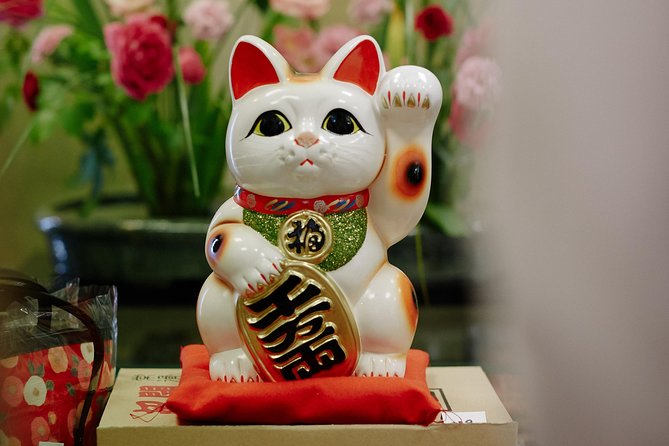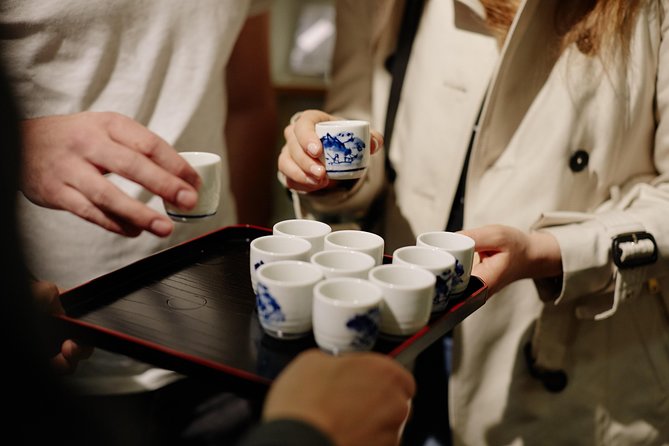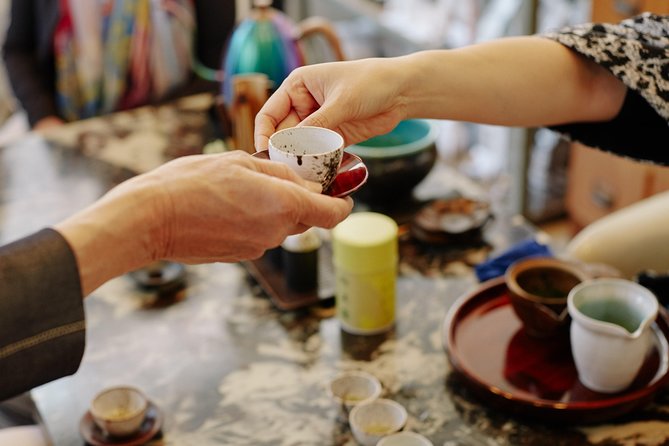Sushi, Sake & Japanese Lifestyle
In a quaint sushi bar nestled in the heart of Tokyo, a master chef delicately prepares each piece of sushi with the precision of an artist crafting a masterpiece.
The marriage of flavors and textures in this bite-sized creation mirrors the intricate tapestry of Japanese lifestyle.
As the chef presents the sushi with a slight bow, one can’t help but wonder about the stories behind each dish and the cultural significance they hold.
The allure of sushi, sake, and Japanese traditions goes far beyond mere sustenance; it offers a gateway to a world where every detail is infused with meaning and purpose, beckoning one to explore further.
Key Points

- Japanese culinary delights offer a fusion of flavors and cultural experiences.
- Sake tasting experiences elevate the traditional Japanese culinary journey.
- Traditional tea ceremonies embody respect, tranquility, and hospitality.
- Exploring Japanese art, culture, and wellness practices enriches the lifestyle experience.
Japanese Culinary Delights

Indulge in a gastronomic adventure with Japan’s culinary delights, offering a fusion of flavors that captivate the palate and illuminate the rich cultural tapestry of the Land of the Rising Sun.
Japanese street food is a vibrant and essential part of the country’s culinary scene, with stalls lining the streets selling delicious and affordable treats like takoyaki (octopus balls) and okonomiyaki (savory pancakes).
For those wanting a more hands-on experience, culinary workshops are a fantastic way to delve deeper into the art of Japanese cooking. These workshops provide a unique opportunity to learn from local experts, gaining insights into traditional techniques and ingredients that define Japanese cuisine.
Whether exploring the bustling food markets or honing culinary skills in workshops, Japan’s culinary scene promises an unforgettable experience for foodies.
Sake Tasting Experiences

Set out on a captivating journey through the intricate world of sake tasting experiences in Japan, where traditional brewing techniques and exquisite flavors await to be discovered.
Sake pairings can elevate the tasting experience, as different types of sake complement various dishes, from light seafood to rich meats.
In Japan, sake brewing is an art that combines age-old traditions with modern innovations, resulting in a wide range of flavors and aromas that cater to diverse preferences.
Exploring sake breweries allows visitors to witness firsthand the meticulous process of fermenting rice and brewing sake, offering a deeper appreciation for this beloved Japanese beverage.
Enjoy the culture and craftsmanship of sake tasting, a true reflection of Japan’s rich culinary heritage.
Traditional Tea Ceremonies

Traditional tea ceremonies in Japan offer a serene and culturally rich experience, where guests can partake in the elegant rituals of preparing and enjoying matcha tea. The roots of tea ceremony etiquette trace back to the 9th century when Buddhist monks brought tea to Japan. This practice evolved over the centuries, becoming a symbol of hospitality, respect, and tranquility.
| Tea Ceremony Etiquette | Tea Ceremony History |
|---|---|
| – Enter tearoom with a bow | – Introduced by Buddhist monks |
| – Remove shoes before entering | – Evolved into a symbol of respect |
| – Sit seiza style (kneeling) | – Emphasizes tranquility |
| – Quietly admire tea utensils | – Reflects Japanese aesthetics |
| – Enjoy matcha with small sips | – Rooted in Zen philosophy |
Exploring Japanese Art and Culture
Explore the vibrant world of Japanese art and culture to uncover a tapestry of traditions and creativity waiting to be explored. Japan’s art and culture reflect a unique blend of tradition and innovation, offering a window into the country’s rich heritage and contemporary trends.
-
Japanese Fashion Trends: Explore the dynamic realm of Japanese fashion, where traditional garments like kimono coexist with avant-garde streetwear, influencing global style.
-
Ikebana Workshops: Enjoy the ancient art of Ikebana, the Japanese practice of flower arrangement that emphasizes harmony, balance, and minimalism.
-
Traditional Arts Exhibitions: Attend exhibitions showcasing a diverse range of traditional arts such as calligraphy, tea ceremonies, and pottery, to gain a deeper appreciation for Japan’s cultural legacy.
Wellness Practices in Japan
What modern wellness practices make Japan a unique destination for those seeking holistic health experiences?
Japan offers a blend of traditional meditation techniques and modern wellness trends that cater to both the body and mind. One of the most iconic practices in Japan is visiting Onsen retreats, natural hot springs believed to have healing properties. These retreats provide relaxation, stress relief, and skin benefits.
Traditional meditation is another cornerstone of Japanese wellness, encouraging mindfulness and inner peace. The country’s serene landscapes, such as peaceful gardens and tranquil temples, create the perfect environment for meditation and reflection.
Whether soaking in the mineral-rich waters of an Onsen or practicing mindfulness in a serene setting, Japan offers a holistic approach to well-being that’s both rejuvenating and culturally enriching.
Common questions

Are There Any Vegetarian or Vegan Options Available for the Sushi and Sake Experiences?
Yes, there are vegetarian sushi and vegan sake options available for the experience. Guests can enjoy sake pairings with vegetarian options. The experience offers a diverse range of choices to cater to different dietary preferences.
Can Children Participate in the Sake Tasting Experiences or Are They Limited to Adults Only?
Children can participate in the sake tasting experiences, but some places might have age restrictions. It’s essential to inquire about sake etiquette and any specific guidelines beforehand. Ensuring a family-friendly setting will enhance the experience for all.
Are There Any Dress Code Requirements for Attending Traditional Tea Ceremonies?
Traditional tea ceremonies often have dress code requirements. Participants are encouraged to wear traditional attire such as kimonos or yukatas to honor the cultural significance of the event. Embracing this tradition adds depth to the experience.
Is It Customary to Tip at the End of the Tea Ceremony or Other Cultural Experiences?
Tipping etiquette varies in cultural experiences like tea ceremonies. In Japan, tipping isn’t customary. Cultural norms emphasize respect and gratitude through gestures rather than monetary tips. Visitors should follow local customs to show appreciation respectfully.
Are There Any Age Restrictions for Participating in Wellness Practices, Such as Hot Spring Bathing or Meditation Sessions?
There are age restrictions for some wellness activities due to safety or cultural reasons. It’s common to have guidelines for hot spring bathing or meditation sessions. These traditional customs prioritize the well-being and experience of all participants.
Last Words
Indulge in the exquisite flavors of sushi and savor the delicate nuances of sake. Enjoy the rich tapestry of Japanese traditions. From traditional tea ceremonies to exploring Japanese art and culture, the world of ‘Sushi, Sake & Japanese Lifestyle’ offers a captivating journey into the heart of Japan.
Embrace the harmony of flavors, the precision of techniques, and the warmth of Japanese hospitality as you uncover the beauty and depth of this fascinating culture. Experience Japan like never before.